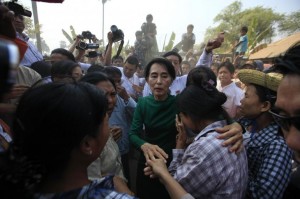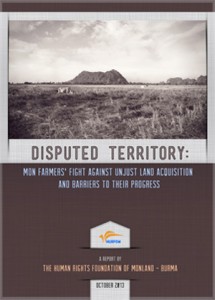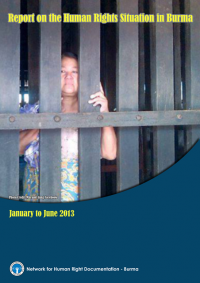Posts Tagged ‘Land Confiscation’ (91 found)
ထားဝယ္ေတာင္သူလယ္သမားမ်ား ဆႏၵထုတ္ေဖာ္ျခင္းအေပၚ သေဘာထားထုတ္ျပန္ခ်က္
အစိုးရအေနျဖင့္ျဖစ္ေစ၊ ပုဂၢလိက ကုမၸဏီတစ္ခုခုမွျဖစ္ေစ ျပည္သူမ်ားပိုင္ဆိုင္ေသာ လယ္ယာေျမမ်ားေပၚတြင္ ဖြံ႕ျဖိဳးေရး စီမံကိန္းမ်ား ေဖာ္ေဆာင္မည္ဆိုပါက ထိုက္တန္ေသာ ေလ်ာ္ေၾကးေပးျခင္း၊ လယ္ယာေျမအစားထိုးေပးျခင္း၊ ျပည္သူမ်ား ေဒသခံမ်ားႏွင့္ ေက်လည္ေအာင္ ညွိႏႈိင္းေဆာင္ရြက္ျခင္းမ်ား ျပဳလုပ္ျပီး သေဘာတူညီမႈရရွိမွသာ […]
• • •Investment at What Cost?
 The re-engagement of Burma with the global, free market economy has created opportunities, hope and great potential. Yet with this re-engagement come significant pitfalls, human rights abuses and the legitimization of past abuses being two of the more serious. All foreign investment must be scrutinized and held to the highest standards in order to avoid either of the above mentioned dangers. Specifically, business ties to any cronies of the Burma Army or perpetrators of human rights abuses must not be tolerated and land confiscation associated with this increased business engagement must end.
The re-engagement of Burma with the global, free market economy has created opportunities, hope and great potential. Yet with this re-engagement come significant pitfalls, human rights abuses and the legitimization of past abuses being two of the more serious. All foreign investment must be scrutinized and held to the highest standards in order to avoid either of the above mentioned dangers. Specifically, business ties to any cronies of the Burma Army or perpetrators of human rights abuses must not be tolerated and land confiscation associated with this increased business engagement must end.
On 7 November, 37 civil society organizations sent a letter to President Barack Obama asking him to update the US Specially Designated Nationals list for Burma. The list is a US Treasury Department list of individuals and companies barred from having financial or business ties to the United States. These individual and companies were barred due to their ties to the military regime, serious human rights abuses, corruption and the selling of weapons to North Korea. This list has remained basically unchanged since 2009; this is despite the ongoing corruption in the country and the very serious human rights violations that have occurred. The US itself acknowledges that the list is out of date, as evidenced by diplomatic cables leaked in 2009 where the US embassy in Rangoon noted that “many of the real perpetrators of human rights abuses or those who provide significant support to the regime are not yet targeted.” An updating of the list and a systematic way of adding and removing names are of immediate importance. To date the US government has been more concerned with establishing economic ties and a revised list could cause complications for US businesses. This is a sad state of affairs when economic interests trump basic human rights […]
• • •Endemic Land Confiscation in Burma: A Major Challenge to the Reform Process
The issue of land confiscation has been and will continue to be one of the largest problems facing Burma. The increase in foreign investment, the liberalization of the economy, and lack of rule of law generally, including both appropriate legislation and an independent judiciary,have resulted in land confiscation on an endemic scale. Thegovernment of Burma has responded […]
• • •Update: Imprisoned Human Rights Defender, Naw Ohn Hla, Faces Additional Charges Related to Campaigns for Land Rights
Human rights defender, Ms Naw Ohn Hla, is facing thirty-three additional charges in relation to her work protecting land rights in Burma. In August 2013, she was sentenced to two years’ imprisonment for disturbing public tranquillity. Naw Ohn Hla is being held in Mandalay prison […]
• • •Myanmar Peace Process Must Address Protection Concerns: NGO Report
Village Survey in Myanmar identifies challenges for poverty alleviation, displaced persons and local governance
The Border Consortium (TBC), an NGO that works with the displaced and conflict-affected people of Myanmar, today released findings from its annual survey which describe chronic poverty, protracted displacement and weak governance as the starting point for conflict transformation. Eleven civil society organisations in South East Myanmar collaborated with TBC to conduct the survey in 209 villages spread across 6 states and regions […]
• • •Burma’s Ethnic Challenge: From Aspirations to Solutions
Important steps have been made in national reconciliation during the past two years. But promises and ceremonies will never be enough. The long-standing aspirations of Burma’s peoples for peace and justice must find solutions during the present time of national transition […]
• • •Disputed Territory: Mon Farmers’ Fight Against Unjust Land Acquisition and Barriers to Their Progress
 Over the years HURFOM has produced a number of accounts highlighting the hardships faced by Mon farmers who became victims of land confiscation or unjust land acquisition. In this report HURFOM follows-up on previously documented abuses and concentrates on an emerging new trend: farmers’ active and collective pursuits for rights to their land.
Over the years HURFOM has produced a number of accounts highlighting the hardships faced by Mon farmers who became victims of land confiscation or unjust land acquisition. In this report HURFOM follows-up on previously documented abuses and concentrates on an emerging new trend: farmers’ active and collective pursuits for rights to their land.
Disputed Territory aims to elaborate on the activities of and express solidarity with farmers who are resolutely, and in some cases for the first time, seeking justice regarding their land […]
HURFOM Releases “Disputed Territory” to Highlight Unjust Land Acquisition in Mon Areas
The Human Rights Foundation of Monland (HURFOM) has released a report titled “Disputed Territory: Mon farmers’ fight against unjust land acquisition and barriers to their progress,” to illustrate contemporary struggles against past and on-going land disputes. Drawing from almost 100 interviews conducted in Ye, Yebyu, and Kyaikmayaw townships, the report presents cases of land confiscation and abuse in Mon areas and elevates the voices of farmers who are actively pursuing justice […]
• • •Report on the Human Rights Situation in Burma (January 2013 – June 2013)
 Over the six months from January to June 2013, ND-Burma documented 147 human rights violations across Burma. These violations occurred in areas of armed conflict but also in areas covered by ceasefires. Each violation is a specific incident, but it may involve any number of victims, from one victim of killing, to forced labor involving many victims, to the forced displacement of an entire village. ND-Burma’s findings demonstrate that, despite progress in reaching ceasefire agreements with non-state armed groups, the government has made little progress protecting the human rights of its citizens. Furthermore, continued arrests of human rights defenders demonstrate that the government is not serious about working with civil society to protect human rights […]
Over the six months from January to June 2013, ND-Burma documented 147 human rights violations across Burma. These violations occurred in areas of armed conflict but also in areas covered by ceasefires. Each violation is a specific incident, but it may involve any number of victims, from one victim of killing, to forced labor involving many victims, to the forced displacement of an entire village. ND-Burma’s findings demonstrate that, despite progress in reaching ceasefire agreements with non-state armed groups, the government has made little progress protecting the human rights of its citizens. Furthermore, continued arrests of human rights defenders demonstrate that the government is not serious about working with civil society to protect human rights […]
ND-Burma Report Documents On-Going Human Rights Abuse in Burma
The Network for Human Rights Documentation – Burma (ND-Burma) has released a periodic report documenting the human rights situation in Burma during the period of January – June 2013. The report documents 147 cases of human rights violations committed by the government and military throughout Burma […]
• • •








 All posts
All posts